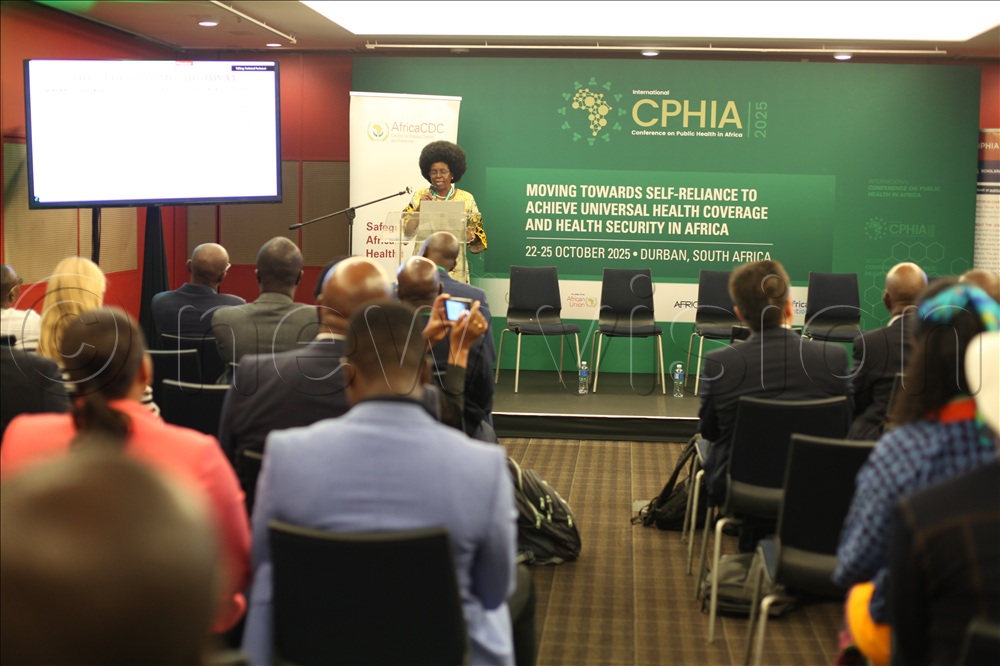Research is the missing link in Africa’s health transformation, says Musenero
Dr Musenero said Africa’s prosperity hinges on its ability to convert scientific knowledge into practical solutions and profitable industries.
Minister of Science, Technology and Innovation, Dr Monica Musenero speaking at the 2025 Conference on Public Health in Africa (CPHIA) in Durban, South Africa. ( Photos by John Musenze)
________________
Minister of Science, Technology and Innovation, Dr Monica Musenero, has urged African nations to make research and development (R&D) the cornerstone of their economic and health transformation, warning that the continent’s overreliance on imported products and donor funding is strangling its growth like an anaconda tightening around its economy.
Delivering a keynote address on October 24, 2025, at the 2025 Conference on Public Health in Africa (CPHIA) in Durban, South Africa, under the theme “Economic Impact of R&D Spending for Local Manufacturing”, Dr Musenero said Africa’s prosperity hinges on its ability to convert scientific knowledge into practical solutions and profitable industries.
“All nations have three resources, natural, human, and time, but they are all raw materials. Wealth is only created when human beings apply knowledge and science to release value from what surrounds them. That process of turning raw value into high value is what R&D does,” she explained.
The Minister warned that Africa’s weak investment in R&D keeps it trapped in a cycle of poverty, late disease detection, and poor health security.
“Because we don’t invest in R&D, we detect diseases late, outbreaks spread, the response becomes more expensive, and GDP is lost,” she said.
“It’s not ignorance, our governments know the importance of research, but the system traps them. When GDP is small and teachers, doctors, and soldiers must be paid, there’s little left for innovation.”
She likened the continent’s dependence on imported medicines to a drainage pipe inserted into the belly of the economy.
“Responding to malaria is like a continuous drainage pipe from our economy. Every time we buy imported drugs, the money exits. And because we don’t manufacture, we lose not just wealth but also the opportunity to create jobs and industries,” she highlighted.
Dr Musenero criticised the prevailing academic culture that values publications over innovation. She revealed that she has been championing a shift in this mindset.
“African scientists are publishing papers that never translate into products. Our pharmacies are full of imported medicines while our universities are full of unpublished innovations,” she said.
“I started attacking the ‘publish or perish’ mentality five years ago. I say it should be product or perish. Professors should retire on royalties, not on pensions. Our universities must start earning from innovation,” she added.

Minister Of Science, Technology And Innovation, Dr Monica Musenero addressing delegates at CPHIA) in Durban, South Africa.
Dr Musenero further cautioned that manufacturing without research is merely an illusion of progress.
“If you bring a fill-and-finish facility but import every container, every diluent, every machine, are you really manufacturing? Without R&D, such facilities may even have a negative economic impact because you’re still importing everything,” she asked.
She applauded former U.S. President Donald Trump’s decision to cut USAID funding, saying it forced Africa to face its dependency.
“We were comfortable in dependency until the funding was withdrawn. Then we fainted. That shock was necessary. It reminded us that our survival must come from within,” she said.
Dr Musenero also called for a more strategic use of the African Continental Free Trade Area (AfCFTA) to promote value-added trade.
“If we all produce corn, are we going to exchange varieties of corn? Trade only thrives where there is value addition,” she noted.
“R&D is the lifeblood of innovation. Without it, you cannot secure your economy, your health, or your independence. Africa’s riches are buried in the brains of its people and in the labs of its universities. We are already rich, but our wealth is hidden. It is time to release it,” she added.
The four-day conference, which began on 22 October, runs under the theme “Moving Towards Self-Reliance to Achieve Universal Health Coverage and Health Security in Africa.” It has drawn delegates from more than 20 countries, alongside representatives from the World Health Organisation (WHO), UNICEF, Gavi, and the Global Fund.
Speaking at the opening ceremony, Dr Jean Kaseya, Director-General of the Africa CDC, said the continent was now reshaping its place in global health.
“For the first time, Africa is inspiring the world,” he declared. “The world is coming to learn from Africa. We are 1.4 billion proud Africans making our own agenda.”
South Africa’s Minister of Science, Technology and Innovation, Dr Blade Nzimande, hailed a new pan-African plan to boost regional vaccine and drug manufacturing as a truly historic development.
The Africa CDC-led Pharmaceutical Manufacturing Plan, spearheaded by the African Union, Afreximbank, and Gavi, carries a US$3.2 billion investment aimed at ensuring that by 2040, at least 60% of all vaccines used in Africa are produced locally.
“By the end of this year, 10% of the continent’s vaccine needs will already be met locally. This is about more than new facilities or technology transfers, it’s an integrated ambition to equip Africa’s people, scientists, and manufacturers with the tools and skills to secure our health sovereignty,” Dr Nzimande told delegates.
He said the plan focuses on expanding manufacturing capacity through regional hubs, ensuring WHO-quality standards, and strengthening drug regulation under the African Medicines Agency.